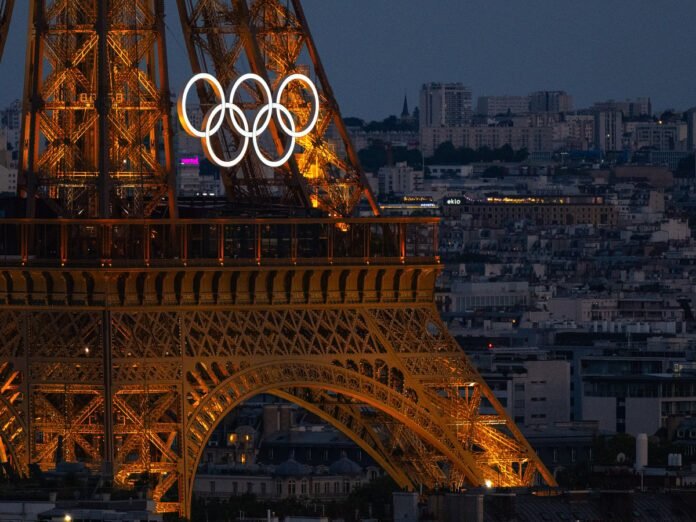In NBC’s quest to provide comprehensive coverage of the Paris Olympics, the network has embraced a new strategy: reaching audiences through TikTok. As athletes from around the globe compete, NBC has turned its attention to capturing the Games through the lens of this popular social media platform. The aim is to connect with a younger audience that engages more with short, dynamic content than traditional broadcasts.
Sunday night showcased this strategy at the Grand Palais, a historic venue with stunning architecture that has been transformed into a dramatic setting for fencing events. The Grand Palais, with its soaring arches and grandiose design, provided a breathtaking backdrop for some of the world’s best fencers. The venue, originally built in 1897, now serves as one of the most visually striking locations at the Paris Olympics.NBC’s TikTok initiative features real-time highlights, athlete profiles, and behind-the-scenes moments that bring the Olympics closer to viewers. The network’s decision to focus on TikTok reflects the growing trend of digital engagement and the shift away from traditional media consumption. By leveraging the platform’s viral potential, NBC aims to offer a fresh perspective on the Games and connect with a demographic that craves immediate, engaging content.The move to TikTok is part of a broader trend where digital platforms are becoming central to how audiences experience major events. As viewers increasingly turn to their phones for updates and entertainment, networks are adapting to meet these demands. NBC’s strategy includes short, captivating clips that capture the excitement and intensity of Olympic competitions, ensuring that fans stay engaged and informed.The Grand Palais event highlighted the appeal of this approach. The historic venue’s transformation for the Games showcased its versatility and grandeur, adding an extra layer of excitement to the fencing events. The competition itself was intense, with athletes showcasing their skills in front of an enthusiastic crowd. The venue’s unique setting added to the spectacle, creating memorable moments that NBC has been eager to share with its TikTok audience.As the Olympics continue, NBC’s focus on TikTok demonstrates the evolving landscape of media coverage. The network’s efforts reflect a broader shift in how major events are presented and consumed. By embracing new technologies and platforms, NBC is not only reaching a new audience but also enhancing the overall viewing experience. The integration of TikTok into their coverage strategy is a testament to the growing importance of digital media in shaping how we experience and interact with global events.NBC’s use of TikTok to cover the Paris Olympics represents a significant shift in media strategy. The network’s efforts to engage viewers through short, dynamic content on social media platforms highlight the changing nature of audience engagement. As the Games progress, NBC’s approach offers a glimpse into the future of sports broadcasting and the role of digital media in shaping our experience of major global events.
NBC’s new approach to Olympic coverage marks a significant shift in how the Games are presented to the public. By harnessing the power of TikTok, the network taps into a platform that excels in delivering short, engaging content. This strategy aims to capture the excitement of the Paris Olympics in a way that resonates with today’s viewers, particularly younger audiences who are accustomed to consuming media in bite-sized formats.
As athletes from various countries compete in the majestic Grand Palais, NBC’s TikTok channel features highlights that showcase the most thrilling moments from each event. The platform’s format allows viewers to experience the intensity of the competition in real-time, with quick clips that provide a sense of immediacy and excitement. This approach contrasts sharply with traditional Olympic broadcasts, which often focus on longer, more detailed segments.
The decision to focus on TikTok also reflects a broader trend of integrating social media into sports coverage. As fans increasingly turn to digital platforms for news and entertainment, traditional media outlets are adapting to meet these evolving preferences. NBC’s use of TikTok is a strategic move to stay relevant in a rapidly changing media landscape, where instant updates and interactive content have become the norm.
The Grand Palais itself, with its stunning architecture and historical significance, adds a unique flavor to the Olympics. The venue’s transformation for the Games highlights its versatility, making it an ideal location for showcasing the elegance and precision of fencing. The combination of this iconic setting with TikTok’s dynamic content creation presents a fresh perspective on the Olympics, blending history with modern media.
In addition to providing real-time highlights, NBC’s TikTok presence also features athlete interviews, behind-the-scenes glimpses, and fan reactions. This multifaceted approach enriches the viewer experience, offering a more comprehensive look at the Games beyond what is typically shown on television. By including personal stories and candid moments, NBC’s TikTok content helps build a deeper connection between athletes and their audience.
This shift towards digital platforms also emphasizes the role of social media in shaping public perception and engagement. As TikTok continues to grow in popularity, its influence on how events like the Olympics are covered and consumed becomes increasingly significant. NBC’s initiative highlights the potential of social media to enhance traditional media coverage and create new opportunities for audience interaction.
Overall, NBC’s strategy to leverage TikTok for Olympic coverage demonstrates an innovative approach to sports broadcasting. By embracing new technologies and platforms, the network not only adapts to changing viewer habits but also sets a precedent for how future events might be covered. As the Paris Olympics unfold, NBC’s efforts to engage audiences through TikTok provide a glimpse into the future of sports media and the evolving ways we experience global events.

